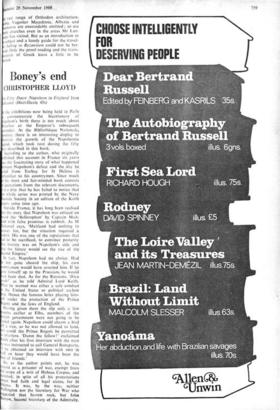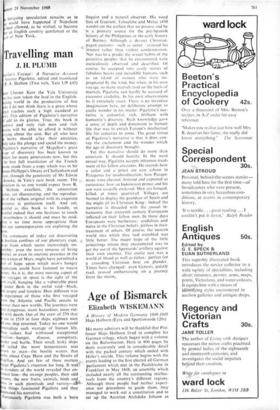Boney's end
CHRISTOPHER LLOYD
ne Fifty Days: Napoleon in England Jean shame! (Hart-Davis 45s) t the exhibitions now being held in Paris commemorate the bicentenary of apoleon's birth there is not much about aterloo or the Emperor's subsequent render. At the Bibliotheque Nationale, never, there is an interesting display to ustrate the growth of the Napoleonic send, which took root during the fifty as described in this book.
According to the author, who originally ublished this account in France six years so. the fascinating story of what happened ween Napoleon's defeat and the day he ded from Torbay for St Helena is nfamiliar to his countrymen. Since much his short and fair-minded book consists quotations from the relevant documents, is a pity that he has failed to notice that e whole series was printed by the Navy cords Society in an edition of the Keith apers some time ago.
Outside France, it has long been realised at the story that Napoleon was enticed on and the 'Bellerophon' by Captain Mait- d with false promises is. rubbish. As M uhamel says, 'Maitland had nothing to nswer for, but the situation required a ulprit. His was one of the reputations that ad to be sacrificed, to convince posterity at history was on Napoleon's side and at the future would see the rise of the cond Empire.'
In fact, Napoleon had no choice. Had not gone aboard the ship, his own ountrymen would have arrested him. If he we himself up to the Prussians he would ave been shot. As for the Russians, 'Dieu order as he told Admiral Lord Keith. hat he wanted was either a safe conduct o the United States or political asylum ere. Hence the famous letter placing him- f under the protection of the Prince esent and the laws of England.
Having _ given them the slip only a few onths earlier at Elba, members of the mish government were not going to be ooled again. Napoleon could charm a bird ff a tree, so he was not allowed to land, or could the Prince Regent be permitted interfere. 'Damn the fellow!' exclaimed eith after his first interview with the man
e was instructed to call General Bonaparte,
f he obtained an interview with HRH in If an hour they would have been the t of friends.'
So, as the author points out, he was eated as a prisorier of war, exempt from e scope of a writ of Habeas Corpus, and estined, in spite of all his protestations bout bad faith and legal status, for St elena. It was, by the way, neither ellington nor the Secretary for War who ggested that barren rock, but John row, Second Secretary of the Admiralty. intriguing speculation remains as to at would have happened if Napoleon i been allowed, as he wished, to become an English country gentleman or the or of New York.











































 Previous page
Previous page